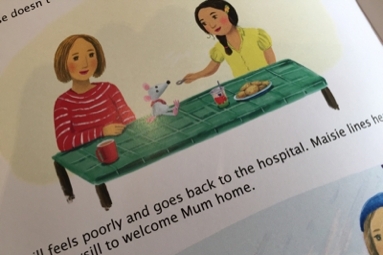So you need a liver transplant?
Life on the waiting list and how to prepare for your transplant
Not everyone with PSC will need a transplant but if your doctor thinks you would benefit from one, you will go through a transplant assessment.
What is a liver transplant assessment?
The liver transplant assessment is a medical, psychological and social assessment of your condition and needs. It will look at your liver, and your health generally, to make sure you are strong enough to have the transplant, that all other medical options have been considered, and to make sure that a liver transplant is right for you at that time.
What tests will I have to have as part of the transplant assessment?
The assessment usually includes:
- blood tests
- a chest X-ray
- an ultrasound scan of the abdomen
- an electrocardiogram (ECG) - check your heart's rhythm and electrical activity
- echocardiogram – a scan of your heart and blood vessels within it
- spirometry – measures your lung capacity
- detailed liver imaging and perhaps an ERCP
- arterial blood gases – measures the PH (acidity) of your blood, as well as the oxygen and carbon dioxide levels.
- upper and lower gastrointestinal endoscopy may be performed.
- discussions with members of the transplant team.
The assessment is also a chance for you to find out all you need to know about having a liver transplant, and how you and your family feel about it. You may even get the chance to talk to others going through the same process and those who have already had a liver transplant. Each liver transplant unit organises their assessment differently. Some run the assessment over two to three days in outpatients, others will ask you to stay in as an inpatient for the assessment.
It’s a good idea to keep notes of the tests you’ve had and any questions that come to you during the assessment.
It’s important to note that a multidisciplinary team (MDT), not a single person on their own, assesses your results and makes the decision. The decision could be:
- you are suitable to be added to the waiting list for a liver transplant.
- a liver transplant might be necessary for you in the future, but the risks outweigh the potential benefits at the time of your assessment.
- a liver transplant is not a suitable option for you. This might be the case if you have other diseases such as heart or lung disease that make you more unlikely to survive the operation.
Because of the unpredictable nature of the condition, most transplant centres try to list PSC patients early for transplant. Once people start getting complications related to PSC like recurrent cholangitis, ascites or persistent jaundice, then transplant may be considered, and you should be under the care of a doctor experienced with PSC and transplant.
More information about liver transplant assessment can be found in this Practice Nursing Transplant Assessment article.
Liver transplants are conducted in liver transplant units or centres. There are also patient support groups at the units. There are eight liver transplant units in the UK and the Republic of Ireland for adults, and three for children:
Liver transplant units for adults
- Birmingham Queen Elizabeth Hospital
- Cambridge Addenbrooke's Hospital
- Dublin St Vincent’s University Hospital
- Edinburgh Royal Infirmary
- Leeds St James's University Hospital
- London King's College Hospital
- London The Royal Free Hospital
- Newcastle Freeman Hospital
Liver transplant units for children
Where can I find emotional support?
Most transplant centres have regular patient support group meetings for liver patients, often led by volunteers.
- Birmingham: The Queen Elizabeth Liver Patients Support Group
- Cambridge: Addenbrookes Liver Transplant Association
- Scotland: BLT Facebook group.
- Leeds: St James Liver Transplant Support Group
- London: LISTEN at King’s
- London: Royal Free London Liver Transplant Patient Support Group (post-transplant patients)
- Newcastle: LIVErNORTH
- All (children): Children's Liver Disease Foundation
PSC Support Facebook group
The PSC Support Facebook group offers a way of connecting with others without even needing to leave home. Transplant centres also have their own support groups - see the section above (where do people have transplants?)
PSC Support operates a dedicated helpline (01235 25 35 45).
If you feel you need more formal support, speak to your doctor about accessing psychological support. Once you have been referred to a psychological service, you will be seen as soon as possible depending on the resources available in your area. If you find your problems are getting worse or are concerned about your wait you should speak to your GP.
How much support will I get post-transplant?
During the first few days and weeks in hospital you will get a lot of support from your medical team. This includes the surgeons, nurses, doctors, dieticians, transplant coordinators, social workers and physiotherapy staff. If they feel you need additional support or equipment to assist you when you first get home, this will be arranged prior to discharge and stay in place for as long as you need it.
You will be seen regularly in a transplant clinic after being discharged from hospital but it is important for you to know who to contact should you have any questions or worries about your health once you are home.
How can I manage my emotions before and after transplant?
Having a transplant can be an overwhelming experience and there is no right or wrong way of dealing with it. For some information about managing emotions and being positive, see Living positively with PSC.


If the results of your liver transplant assessment show that you are suitable for a liver transplant, you will be added to the liver transplant waiting list. Once you are added to the liver transplant waiting list, you will receive regular monitoring.
At this stage you will be given plenty of information and support. Most people are well enough to live at home while they wait. You’ll give your contact details to your transplant coordinator so that they can get in touch with you when a potential liver becomes available. It’s important that you keep in touch with your co-ordinator and make sure that you are contactable at all times. Some people even use a separate mobile phone just for this purpose so that they never miss that all important call. If your transplant coordinator is unable to contact you when a suitable liver becomes available, you could miss the chance of a transplant.
Equally you must keep in touch with your transplant co-ordinator and let them know if you have any unplanned hospital visits or there is a change in your condition. If in doubt, it is always best to let your transplant co-ordinator know.
Whilst you are on the waiting list, you may be called in because a potential liver has become available for you, but after further checking, it is not suitable, yet you find yourself halfway to the hospital or even already there. This does happen sometimes, and it can be an emotional and stressful time. Some people report having more than ten calls before the right liver was available for them. It is important that the transplant unit takes action as soon as they know a liver could be suitable for you and sometimes circumstances beyond their control mean that your transplant cannot go ahead on that occasion.
With the growing numbers of liver related illness, and a transplant system where the supply of donor organs does not meet the demand, donor livers are precious and must be put to the best use possible. This is a challenge that NHSBT, the blood and transplant authority for the UK, has addressed and in 2018, moved to a new system called the National Liver Offering Scheme (NLOS).
The purpose of the NLOS is to save as many lives as possible and get the best use possible out of all donated organs. The more detailed analysis of both recipient requirements and donor features increases the likelihood that the right liver will be offered to the right person at the right time.
The ethical considerations in offering organs are transplant benefit, need and utility.
- Transplant benefit - the difference between a patient’s expected survival if receiving a particular donated liver and the patient’s expected survival without a transplant.
- Need - how much someone needs a transplant. For example, if someone has acute liver failure from a virus or a paracetamol overdose, and if they don’t get a transplant they might die straight away; they need a transplant urgently.
- Utility - how much use the recipient will get out of the donated liver; how long that person will survive.
The UK Liver Advisory Group agrees that ‘transplant benefit’ based offering is the optimum approach92. Transplant benefit integrates elements of a patient’s need for a transplant and a patient’s utility from receiving a particular donated liver. It also takes into account information about that donated liver. In this way, the NLOS can look at everybody on the waiting list to decide who is the best match for the next available liver.
Transplant Benefit Score
The new system to decide who gets the next liver transplant uses a scoring system called the Transplant Benefit Score (TBS), which is more in-depth than the previous UKELD scoring system, and takes into account features of both patients on the waiting list and from the donor:
Recipient Factors
Age
Sex
Hepatitis C
Disease group
Creatinine
Bilirubin
INR
Sodium
Potassium
Albumin
Renal support
Inpatient status
Previous abdominal surgery
Encephalopathy
Ascites
Time on waiting list
Diabetes
Maximum AFP level
Maximum tumour size
Tumour numbers
Liver Donor Factors
Age
Cause of death
BMI
Diabetes
Donor type
Blood group
Split liver criteria
Transplant Benefit Score and Variant Syndromes
A small proportion of available organs will be offered to patients waiting for a liver transplant with Variant Syndrome (VS). VS refers to patients for whom the TBS is not appropriate and so their position on the waiting list will be prioritised according to waiting time. The frequency of organs offered to VS patients is based on the proportion of VS patients registered on the List (which at present is around three in every hundred organs offered).
National System
Livers will be matched on a national basis rather than the previous regional basis, meaning all patients on the list are considered for the liver transplant (national allocation).
There are many factors that affect how long you may wait for a liver transplant, such as blood group, weight and the type and severity of liver disease. The UK introduced a new system called the National Liver Offering Scheme in March 2018 to decide who is offered available organs for liver transplant first. The Liver Offering Scheme means potential organs (livers) for transplant are matched to patients on the waiting list in a more in-depth way than previously. This is expected to increase the number of lives saved and improved by liver transplant.
See PSC Support statement 30 September 2022 about waiting times for liver transplants.
Yes, you can travel. You let your transplant co-ordinator know if you plan to travel, as they need to know your location in case a potential donor liver becomes available. You may be suspended from the list for the duration of your holiday if you are travelling a long distance from the hospital, and would not be able to get to the hospital in time if you had a call for transplant.
Yes, if you feel up to it. Some people continue to work right up until their transplant, while others reduce their working hours or stop working altogether.
You may be suspended or removed from the liver transplant list if you are not fit enough to survive the surgery or if you have an infection (and sometimes if you are travelling). Your condition might even improve to such an extent that you become too well for a liver transplant (that means that your survival expectations without a liver transplant are higher than those you would have if you undergo the transplant operation), in which case you will be removed from the list.
During your time on the waiting list, your liver centre will regularly update your progress in a national database. Therefore, if your condition does deteriorate, this information is incorporated into the National Liver Offering Scheme and included in decisions made about who the next available liver will go to. This is one of the potential advantages about the new scheme.
The one, 5 and 10-year survival rates following liver transplantation for PSC are excellent 79.
This is not easy but the patient support group at Addenbrooke's have come up with a fantastic aid with author Julia Rawlinson.
Addenbrooke's Liver Transplant Association (ALTA), in conjunction with the well-known children's author, Julia Rawlinson have created a beautiful little book, 'Mending Mum', to help with this sensitive situation.
The book is free to parents facing liver transplant (from any of the transplant units).
The illustrator is Tiphanie Beeke, Julia's regular illustrator, who in fact is an ex nurse so the pictures in the book are realistic.


 You will usually be told to only take one bag with you when you get your call, containing only the essentials.
You will usually be told to only take one bag with you when you get your call, containing only the essentials.
The following suggestions are from people on our Facebook group who have had a transplant:
Toiletries
- toothbrush
- face wipes
- lip balm (lips can become very dry post-op)
- moisturiser for dry skin
- deodorant
- hairbrush
- hair bands
- perfume or body spray
- dry shampoo (in case you can’t shower for a few days)
Clothing
- spare pyjamas and underwear as you may get leaks from where the drains are fitted
- comfy socks
- flip flops or slippers
- lightweight dressing gown for when you’re more mobile
- loose-fitting, comfortable clothes for when you feel like getting dressed
Other
- snacks
- straw for drinking
- natural remedies to help relieve constipation e.g. peppermint tea bags and prunes (but check with your medical team before you take anything)
- books, colouring, mp3 player, tablet to watch things on, puzzle book, pen and paper
- photos of loved ones (especially if they may not be able to visit you when recovering)
- something to make you smile
- mobile phone/other chargers – with a long lead as sockets are often far from the bed
- loose change in case the shop trolley comes by or you go out to the hospital shop or café
Information to help you prepare for liver transplant by those who have been through it
Huge thanks to members of our Facebook group for these tips:
- Have your bag packed and ready to go!
- Keep as fit and active as possible to help the recovery and eat as healthily as possible.
- Try to keep your mind occupied and active to help with the stress of waiting. Try to remember you are not alone.
- Keep your phone with you at ALL times and fully charged.
- Don’t panic about missing a call, the coordinators will go out of their way to get hold of you and will have numerous contacts for you if they can’t get you at home or on your mobile.
- For early stage recovery do not be afraid to call the liver coordinators if you have any concerns or worries. They can be called at any time of the day or night and would rather you call than sit at home worrying about something.
- Time and rest are the best healers. Listen to your body and try not to over-do it in the first few months.
- Talk to others who have been or are going through the transplant process. You can ask your transplant team if they can put you in touch with someone, or use the PSC Support Facebook group to chat to others.
- Find ways to stay positive while you wait for the call.
Related news
Help to get active after transplant
A new online programme from the World Transplant Games Federation was launched today to improve fitness, nutrition, wellbeing and quality of life.




